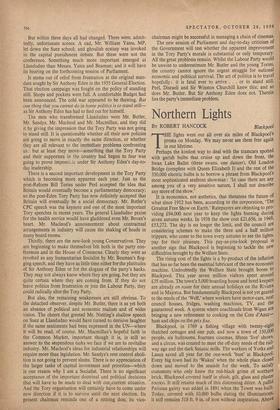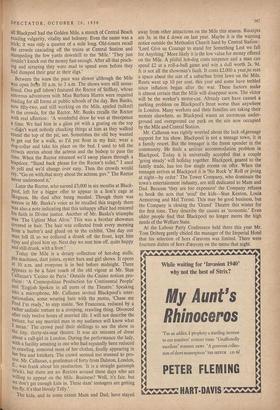Northern Lights
THE lights went out all over six miles of Blackpool's proms on Monday. We may never see them free again in our lifetime. Perhaps the kindest way to deal with the tramcars spotted with garish bulbs that cruise up and down the front, the Swan Lake Ballet (three swans, one dancer), Old London Bridge (complete with Queen Elizabeth 1) and the rest of the 330,000 electric bulbs is to borrow a phrase from Blackpool's most sophisticated seafront showman : `In case there are any among you of a very sensitive nature, I shall not describe any more of the show.' It is economics, not aesthetics, that threatens the future of what since 1912 has been, according to the corporation, 'The Greatest Free Show on Earth.' Ratepayers are objecting to pro- viding £94,000 next year to keep the lights burning during seven autumn weeks. In 1938 the show cost £21,656, in 1949. £53,272. The sky is no longer the limit, and the council are considering schemes to make the three and a half million trippers, who come to the town every autumn to see the lights. pay for their pleasure. This pay-as-you-look proposal is another sign that Blackpool is beginning to tackle the new difficulties brought by the Welfare State.
The rising cost of the lights is a by-product of the inflation that has so far been the essential lubricant of the new economic machine. Undoubtedly the Welfare State brought boom to Blackpool. This year seven million visitors spent around £35 million. The town's 5,000 boarding house and hotel keepers are already en route for their annual holidays on the Riviera and in Majorca. But fundamentally Blackpool is not yet geared to the needs of the `Welf,' where workers have motor-cars, neat council houses, fridges, washing machines, TV, and the guaranteed week. A system where coachloads from Wigan arc bringing a new refinement to cooking on the Cote d'Azur-' ham and chips on the prix fixe. Blackpool, in 1769 a fishing village with twenty-eight thatched cottages and one pub, and now a town of 150,000 people. six ballrooms, fourteen cinemas, fifteen 'live' shows, and a circus, was created to meet the off-duty needs of the rail' way age and the dark Satanic mills. The workers of Yorks and Lanes saved all year for the one-week `bust' at Blackpool. Every big town had its 'Wakes' when the whole place closed down and moved to the seaside for the week. To satisfy customers who only knew the red-black grime of northern brick, Blackpool covered itself in plush, gilt, glass and plaster rococo. It still retains much of this distressing decor. A pallid Parisian gaiety was added in 1891 when the Tower was built. Today, covered with 10,000 bulbs during the illuminations, it still remains 518 ft. 9 in. of iron without inspiration. Above all Blackpool had the Golden Mile, a stretch of Central Beach exuding vulgarity, vitality and boloney. Even the name was a trick; it was only a quarter of a mile long. Old-timers recall the crowds cascading off the trains at Central Station and stampeding the few yards downhill to the `Mile.' They just Couldn't knock out the money fast enough. After all that pinch- ing and scraping they were mad to spend even before they had dumped their gear at their digs.'
Between the wars the pace was slower although the Mile was open frcfin .10 a.m. to 3 a.m. The shows were still sensa- tional. One gaff (show) featured the Rector of Stiffkey, whose amorous adventures with Miss Barbara Harris were required reading for all forms at public schools of the day. Ben Banks, now fifty-two, and still working on the Mile, spieled (talked) to the crowds, for the Rector. Mr. Banks recalls the Rector with real affection : 'A wonderful draw he was at threepence a time. We had him in a glass pit with a grating on the top —didn't want nobody chucking things at him as they walked round the top of the pit, see. Sometimes the old boy wanted to get out for, a walk, so I'd put flour in my hair, wear a dog-collar and take his place on the bed. I used to tell the crowds stories about the actress and the bishop to pass the time. When the Rector returned we'd swop places through a trapdoor. "Stand back please for the Rector's toilet," I used to yell and we'd change over easy. Then the crowds would cry. "Go on with,that story about the actress, guy." The Rector never understood it.'
Later the Rector, who earned £3,000 in six months at Black- Pool, left for a bigger offer to appear in a lion's cage at Skegness. He died after being mauled. Though there was sorrow in Mr. Banks's voice as he recalled this tragedy there Was also a note indicating that this unhappy affair had restored his faith in Divine justice. Another of Mr. Banks's triumphs was 'The Ugliest Man Alive.' This was a brother showman Covered in hair. The hair was collected fresh every morning from a barber's and glued on to the exhibit. 'One day our man fell ill so we collared a drunk off the front, kept him tipsy and glued him up. Next day we sent him off, quite happy and still drunk, with a 'fiver.'
Today the Mile is a dreary collection of hot-dog stalls, Pin machines, dart joints, oyster bars and girl shows. It opens at 10 a:m. and everyone is in bed before midnight. There appears to be a faint touch of the old vigour at Mr. Stan Callanan's 'Casino de Paris.' Outside the Casino notices pro- claim : 'A Cosmopolitan Production for Continental People' and 'English Spoken in all parts of the Theatre.' Speaking into a microphone, Mr. Callanan invited Blackpool's inter- nationalists, some wearing hats with the motto, 'Chase me Fred I'm ready,' to step inside. 'See Francesca, reduced by a rather sadistic torture to a creeping, crawling thing. Divorced after only twelve hours of married life. I will not describe the torture. but any married man in my audience will know what mean.' The crowd paid their shillings to see the show in the tiny, thirty-six-seat theatre. It was six minutes of drear about a call-girl in London. During the performance the lady, with a facility amazing in one who had reputedly been reduced to crawling, removed most of her clothes, finally appearing in her bra and knickers. The crowd seemed too stunned to pro- test. Mr. Callanan, a gentleman of forty from Dalston, London, E, was frank about his production. 'It is a straight gazumph (trick), but there are no Rectors around these days who are willing to appear on the Mile. Business? Well, it's fair, but We don't get enough kids in. These dam' teenagers are getting too fly, it's that bloody Telly.' The kids, and to some extent Mum and Dad, have stayed away from other attractions on the Mile this season. Receipts are 3s. in the £ down on last year. Maybe it is the warning notice outside the Methodist Church hard by Central Station : `Lord Give us Courage to stand for Something Lest we fall for Anything.' More likely it is the low value for money offered on the Mile. A pitiful hot-dog costs tenpence and a man can spend £2 at a roll-a-ball game and win a doll worth 2s. 9d. It is not all the showman's fault. It costs £2,000 a year,to rent a space about the size of a suburban front lawn on the Mile. Rents went up 10 per cent. this year and some have trebled since inflation began after the war. These factors make it almost certain that, the Mile will disappear soon. The victor will be the worker's motor-car. Already cars have caused a parking problem on Blackpool's front worse than anywhere in London. Many workers and their families are taking their motors elsewhere, so Blackpool wants an enormous under- ground and overground car park on the site now occupied by the Mile and Central Station.
Mr. Callanan was rightly worried about the lack of genage support for his show. Blackpool is not a teenage town, it is a family resort. But the teenager is the freest spender in the community. He finds a serious accommodation problem in Blackpool. Today it is universally accepted that a couple `going steady' will holiday together. Blackpool, geared to the family trade, has too few single rooms on offer. When the teenager arrives at Blackpool it is `No Rock 'n' Roll or jiving at night—by order.' The Tower Company, who dominate the town's entertainment industry, are still dedicated to Mum and Dad. Because 'they are too expensive' the Company refuses to book the acts that 'send' the kids—Stan Kenton, Louis Armstrong and Mel Torme. This may be good business, but the Company is closing the 'Grand' Theatre this winter for the first time. They describe the causes as 'economic.' Even older people find that Blackpool no longer meets the high needs of the Welfare State.
At the Labour Party Conference held there this year Mr. Tom Driberg gently chided the manager of the Imperial Hotel that his selection of hors d'oeuvres was limited. There were fourteen dishes of hors d'oeuvres on the menu that night.











































 Previous page
Previous page